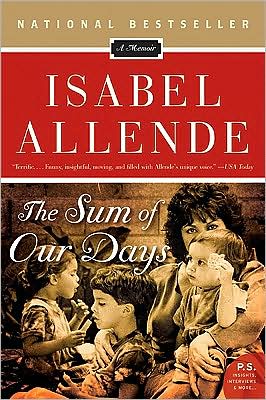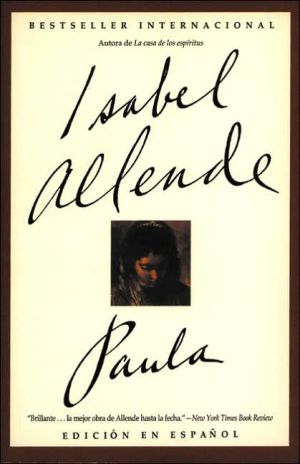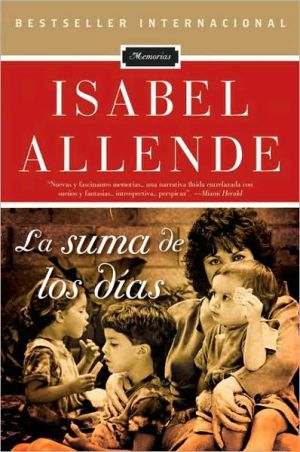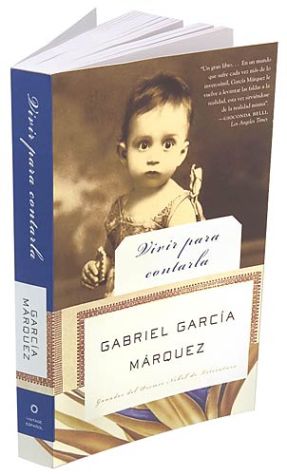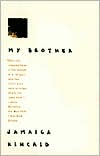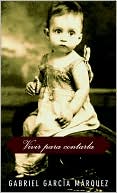The Sum of Our Days
In The Sum of Our Days, internationally acclaimed author Isabel Allende reconstructs the painful reality of her own life in the wake of the tragic death of her daughter, Paula. Narrated with warmth, humor, exceptional candor, and wisdom, this remarkable memoir is as exuberant and full of life as its creator. Allende bares her soul as she shares her thoughts on love, marriage, motherhood, spirituality and religion, infidelity, addiction, and memory—and recounts stories of the wildly eccentric,...
Search in google:
In The Sum of Our Days, internationally acclaimed author Isabel Allende reconstructs the painful reality of her own life in the wake of the tragic death of her daughter, Paula. Narrated with warmth, humor, exceptional candor, and wisdom, this remarkable memoir is as exuberant and full of life as its creator. Allende bares her soul as she shares her thoughts on love, marriage, motherhood, spirituality and religion, infidelity, addiction, and memory and recounts stories of the wildly eccentric, strong-minded, and eclectic tribe she gathers around her and lovingly embraces as a new kind of family. The Barnes & Noble Review Reading this memoir by Isabel Allende is like showing up at a party of someone else s relatives and settling into the thoroughly engaging company of the family matriarch. She tells the story of 15 years of her life with disarming honesty and a deeply self-deprecating humor, illuminating collective truths about the challenge of maintaining boundaries in close relationships and leading a rich and satisfying existence in the aftermath of tragedy. In this sense, the prolific Chilean-American author stands out -- without cynicism or earnestness -- as one of the strongest and most authentic women s voices in contemporary literature.
\ The Sum of Our Days \ A Memoir \ \ By Isabel Allende HarperCollins \ Copyright © 2008 \ Isabel Allende\ All right reserved.\ \ ISBN: 978-0-06-155183-3 \ \ \ Chapter One Darkest Waters \ In the second week of December, 1992, almost as soon as the rain let up, we went as a family to scatter your ashes, Paula, following the instructions you had left in a letter written long before you fell ill. As soon as we advised them of your death, your husband, Ernesto, came from New Jersey, and your father from Chile. They were able to tell you good-bye where you lay wrapped in a white sheet waiting to be taken to the crematory. Afterward, we met in a church to hear mass and weep together. Your father was pressed to return to Chile, but he waited until the weather cleared, and two days later, when finally a timid ray of sun peered out, the whole family, in three cars, drove to a nearby forest. Your father went in the lead, guiding us. He isn't familiar with this region but he had spent the previous two days looking for the best site, one that you would have chosen. There are many places to choose from, nature is prodigal here, but by one of those coincidences that now are habitual in anything related to you, he led us directly to the forest where I often went to walk to ease my rage and pain while you were sick, the same one where Willie had taken me for a picnic shortly after we met, the same one where you and Ernesto liked to walk hand in hand when you came to visit us in California. Your father drove into the park, followedthe road a little way, parked the car, and signaled us to follow him. He took us to the exact spot that I would have chosen, because I had been there many times to pray for you: a stream surrounded with tall redwoods whose tops formed the dome of a green cathedral. There was a fine, light mist that blurred the contours of reality: the light barely penetrated the trees, but the branches shone, winter wet. An intense aroma of humus and dill rose from the earth. We stopped at the edge of a pond formed by rocks and fallen tree trunks. Ernesto, serious, haggard, but now without tears because he had spilled them all, held the clay urn containing your ashes. I had saved a few in a little porcelain box to keep forever on my altar. Your brother, Nico, had Alejandro in his arms, and your sister-in-law, Celia, held Andrea, still a baby, wrapped in shawls and clamped to her breast. I carried a bouquet of roses, which I tossed, one by one, into the water. Then all of us, including Alejandro, who was three, took a handful of ashes from the urn and dropped them onto the water. Some floated briefly among the roses, but most sank to the bottom, like fine white sand.\ "What is this?" Alejandro asked.\ "Your aunt Paula," my mother told him, sobbing.\ "It doesn't look like her," he commented, confused.... I will begin by telling you what has happened since 1993, when you left us, and will limit myself to the family, which is what interests you. I'll have to omit two of Willie's sons: Lindsay, whom I barely know-I've seen him only a dozen times and we've never exchanged more than the essential courteous greetings-and Scott, because he doesn't want to appear in these pages. You were very fond of that thin, solitary boy with thick eyeglasses and disheveled hair. Now he is a man of twenty-eight; he looks like Willie and his name is Harleigh. He chose the name Scott when he was five; he liked it and used it a long time, but during his teens he reclaimed the one given him.\ The first person who comes to my mind and heart is Jennifer, Willie's only daughter, who at the beginning of that year had just escaped for the third time from a hospital where she had gone to find rest for her bones because of yet another infection, among the many she had suffered in her short life. The police had not given any indication that they were going to look for her; they had too many cases like hers, and this time Willie's contacts with the law didn't help at all. The physician, a tall, discreet Filipino who by dint of perseverance had saved her when she arrived at the hospital with a raging fever, and who by now knew her because he had attended her on two previous occasions, explained to Willie that he had to find his daughter soon or she would die. With massive doses of antibiotics for several weeks, he might be able to save her, he said, but we had to prevent a relapse, for that would be fatal. We were in the emergency room-yellow walls, plastic chairs, and posters of mammograms and tests for AIDS-which was filled with patients awaiting their turn to be treated. The doctor took off his round, metal-framed glasses, cleaned them with a tissue, and guardedly answered our questions. He had no sympathy for Willie or for me; he perhaps mistook me for Jennifer's mother. In his eyes we were guilty; we had neglected her, and now when it was too late, we had showed up acting distressed. He avoided going into details-patient information was confidential-but Willie could deduce that in addition to multiple infections and bones turned to splinters, his daughter's heart was on the verge of giving out. For nine years Jennifer had persisted in jousting with death.\ We had been going to see her in the hospital for several weeks. Her wrists were tied down so that in the delirium of fever she couldn't tear out the intravenous tubes. She was addicted to nearly every known drug, from tobacco to heroin. I don't know how her body had endured so much abuse. Since they couldn't find a healthy vein in which to inject medications, they ...\ (Continues...)\ \ \ \ \ Excerpted from The Sum of Our Days by Isabel Allende Copyright © 2008 by Isabel Allende. Excerpted by permission.\ All rights reserved. No part of this excerpt may be reproduced or reprinted without permission in writing from the publisher.\ Excerpts are provided by Dial-A-Book Inc. solely for the personal use of visitors to this web site.\
\ Publishers WeeklyAllende follows Paula, the heartbreaking memoir she wrote while her daughter lay in a long coma, with another missive to the young woman, now dead, to update her on the Allende clan's adventures and dramas, which often seem straight from her novels. For most of the narration, Brown's bright voice and careful delivery are an ideal conduit for Allende's renowned prose, working in tandem with the author's unique descriptions to make interesting what in other lives would hardly be remarkable. When speaking as Allende, she uses a husky Spanish accent that is distinctively charming and appropriate without going over the top. Brown's pronunciation of occasional Spanish phrases and names sometimes lack fluency but the frank, twangy voice she gives to Allende's friend Tabra is refreshingly at ease. By the end, even listeners who are unfamiliar with Allende's history and writing will feel they know this feisty woman and brilliant writer as a friend. A Harper hardcover (Reviews, Feb. 18).\ Copyright © Reed Business Information, a division of Reed Elsevier Inc. All rights reserved.\ \ \ \ \ Library JournalNew York Times best-selling novelist Allende (Inés of My Soul) revisits the memoir form of her 1995 book, Paula, which she wrote in the form of a letter to her late daughter, that title's namesake. Here, she again addresses Paula in a series of reminiscences, letters, and other correspondence. Tony® Award-winning actress Blair Brown expertly narrates, always capturing the humor and the sorrow. Highly recommended. [Audio clip available through www.harperaudio.com; the Harper hc was recommended for all literature collections, LJ4/15/08.-Ed.]—Joyce Kessel\ \ \ Kirkus ReviewsLoving tribute to an unorthodox family. In Allende's acclaimed memoir Paula (1995), the Chilean-born novelist told the story of her tumultuous life in the form of a letter to her beloved, recently deceased daughter. This follow-up picks up the story where the previous book left off, in the guise of keeping the spirit Paula informed of the goings-on in her noisy, exuberant, sometimes tragic extended family. Studded with incredible, often soap-operatic events, the stories here could be melodramatic or even self-indulgent. Instead, burnished by the author's enormous affection for (almost) every character, the book coalesces into a warm meditation on family and love. After the devastation of Paula's yearlong decline and eventual death, Allende undertook to gather her fractured clan around her in northern California, where she lived with her American husband Willie. She writes of the couple's attempts to save his daughter Jennifer. When the drug-addicted young woman lost custody of her fragile, premature baby girl, they found Sabrina a home with a lesbian couple in a Zen monastery. Jennifer was allowed to visit her daughter, but she grew steadily weaker and vanished not long before Sabrina's first birthday. We also learn of the author's turbulent but loving relationship with her contrarian, hotheaded daughter-in-law, who fractured the family by leaving Allende's son Nico for the woman engaged to Willie's stepson. In the same tell-all spirit, the writer discusses the various heartaches of her steadfast friends, Tabra and Juliette; her successful courtship of the woman she wanted to be Nico's second wife (they are now happily married); her own numerous parenting and marital missteps; and thepainful process of getting over her daughter's death. A turbulent life to be both pitied and envied, and a book to be savored and reread. Agent: Carmen Balcells/Carmen Balcells Agencia Literaria\ \ \ \ \ USA Today"THE SUM OF OUR DAYS is terrific. It’s funny, insightful, moving and filled with Allende’s unique voice."\ \ \ \ \ Dallas Morning News"...Ms.Allende...executes this epistolary memoir with the same authenticity and poetry that grace her fiction...Ms. Allende is a survivor worth reading and emulating."\ \ \ \ \ Denver Post"A vibrant voice, which is at once introspective and forthright…an inspiring and thought-provoking work…The insights resonate, on page after page."\ \ \ \ \ Los Angeles Times Book Review"Allende is a genius."\ \ \ \ \ St. Louis Post-Dispatch"Allende’s THE SUM OF OUR DAYS adds up to an exuberant love letter—not only to her daughter, but to her tribe and anyone lucky enough to belong to one."\ \ \ \ \ Seattle Post-Intelligencer"A powerful memoir"\ \ \ \ \ The Barnes & Noble ReviewReading this memoir by Isabel Allende is like showing up at a party of someone else's relatives and settling into the thoroughly engaging company of the family matriarch. She tells the story of 15 years of her life with disarming honesty and a deeply self-deprecating humor, illuminating collective truths about the challenge of maintaining boundaries in close relationships and leading a rich and satisfying existence in the aftermath of tragedy. In this sense, the prolific Chilean-American author stands out -- without cynicism or earnestness -- as one of the strongest and most authentic women's voices in contemporary literature.\ In one of the daily letters she exchanges with her daughter, Allende's mother writes, "Child, we come into this world to lose everything. It costs nothing to let go of material things, what's difficult is to give your loved ones their freedom." This prescient understanding captures the essence of The Sum of Our Days, which is so full of family members and friends, it's impossible to pinpoint any one of their high-wire dramas and comical encounters as more significant than the others. One of the first chapters describes Allende's stepdaughter giving birth to a baby and then disappearing; another chapter relays the author's peripheral involvement in turning one of her novels into a movie (and her subsequent permanent crush on Antonio Banderas). All of the disparate plots are strung together as the summation of the family members' lives, recounted to Allende's deceased daughter, Paula.\ The epistolary style is one familiar to Allende, whose stunning 1982 debut novel, House of the Spirits, began as a private missive to her then 99-year-old grandfather. She adopted the form again for Paula, which she started writing while her daughter was in the hospital in Spain, and The Sum of Our Days picks up where it left off, as a conversation in which Allende sets out to relay everything that's happened between 1993 and 2007.\ This book is structured as a 300-page letter addressed to Allende's daughter, who died in 1992 at age 28. Paula's death and the yearlong coma that preceded it -- caused by a rare metabolic disorder called porphyria -- were the subject of Allende's first memoir. Like Joan Didion's Year of Magical Thinking, Paula possessed two arcs. The primary one was dedicated to detailing her daughter's sudden lapse into a coma, from which she never awoke, while the other thread revisited their family's history with deeply personal stories that underscored the impact of Paula's absence. In The Sum of Our Days, the focus on Paula's physical deterioration in the hospital is replaced with wildly entertaining stories about Allende's family and anecdotes from her own life, everything from carrying the Olympic flag in Turin, Italy (trailing behind the glamorous Sophia Loren) to a secret love affair that caught everyone in their home off-guard.\ The narrative clips along at a steady pace, due partly to Allende's sense of humor and appetite for adventure. Averaging three to four pages each, these chapters offer flashes similar to watching an episodic -- and shockingly well written -- television show. Allende's vignettes are filled with energy, and one prominently featured group of friends, dubbed the Sisters of Perpetual Disorder, "share their lives, meditate, pray for people," and, since Allende joined, also eat bonbons and sometimes go to the opera.\ She writes eloquently of her second husband, Willie, an extremely hardworking lawyer to whom she has been married since 1988, following a divorce from her husband of 25 years. Their meeting was precipitated by Willie's reading Allende's novel Of Love and Shadows, about which he wrote in a note, "The author understands love the way I do," before showing up for one of her book events. Together, they've faced enormous difficulties that have strained their relationship to a near-breaking point. In the shadow of Paula's death, Allende credited Willie as a reason to go on living, and she illustrates the sadness permeating their world not as "a paralyzing emotion but an awareness of the losses and difficulties that colored our reality." At times, theirs has been a hot relationship, no stranger to volatility, but at the end of the day, Allende says plainly, "I like Willie a lot."\ In all three of her nonfiction works, including 1997's Aphrodite -- a memoir about the overlap between food and love that loosely blends folklore with Allende's reminiscences -- characters outshine plot. Allende writes all of her books in Spanish, and the excellent Margaret Sayers Peden then translates them into English. It's a testament to both women's skills that Allende's memoirs about her daughter, like Didion's, are notable for their perfect language, which renders the complicated stages of grief with exacting and empathic precision.\ Vivian Gornick, Carolyn Steedman, and Simone de Beauvoir have mined the connection between mothers and daughters to great effect, but there is no living author who channels the subject with as much joy and gratitude as Allende. Her openness in describing the process of grieving for a lost child, as well as the travails of the relationships that developed or imploded in the years since Paula's death, astonishes. As demonstrated by the book's cover, Allende, even in her mid-60s, possesses the kind of beauty that comes from having lived fully. She makes repeated references to her height (too short) and her appearance (not what it used to be), but these admissions only serve to make her more attractive to the reader. By confessing secrets -- her facelift, her family's widely accepted view that Paula's ghost inhabits their home (even after they move) -- Allende makes for a credible storyteller. After making it clear that this writing is an address to her daughter, she lets it drop, allowing room to feel that she is, in fact, taking the reader into her fold. The close confidence of Allende's tone invites identification not only to the perspective a mother who has lost a child but to a woman whose confessed challenge is staying out of others' problems until asked for help. Underneath the immense and unbearable pain of losing her only daughter lies the stuff of romantic comedies and soap operas -- dishes to be done, family knots to be untangled or accepted, and, always, pages to write.\ While offering up reasons why, after divorcing her first husband, she expected to be single for the rest of her life, Allende writes, "I have unusual work habits that cause me to spend half my available time alone, not speaking, in hiding." The flip side of this dedication to ritual, however, is her substantial body of work, covering a vast range of subjects. For the past 25 years, on the eighth day of January, Isabel Allende has started work on a new book; but when beginning this memoir in 2006, she hesitated for fear of offending relatives by exposing herself -- and them -- as material. What outweighed her fear was the motivation to tell a good story, which she's done here, many times over.\ For Allende, the sum of her days can't be separated from her family -- what she refers to as her tribe -- and this book is, above all else, a testament to her unwavering loyalty to both her biological and chosen kin, whose joys and pains, and quotidian successes and disasters, reflect her profound investment in their lives; even after they're gone, her loved ones are kept close. --Sarah Norris\ Sarah Norris, arts editor of The Villager, has reviewed books for The New Yorker, Village Voice, Time Out New York, and other publications.\ \ \
